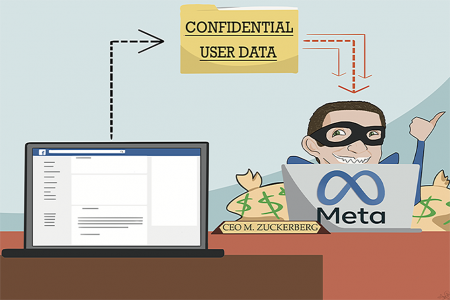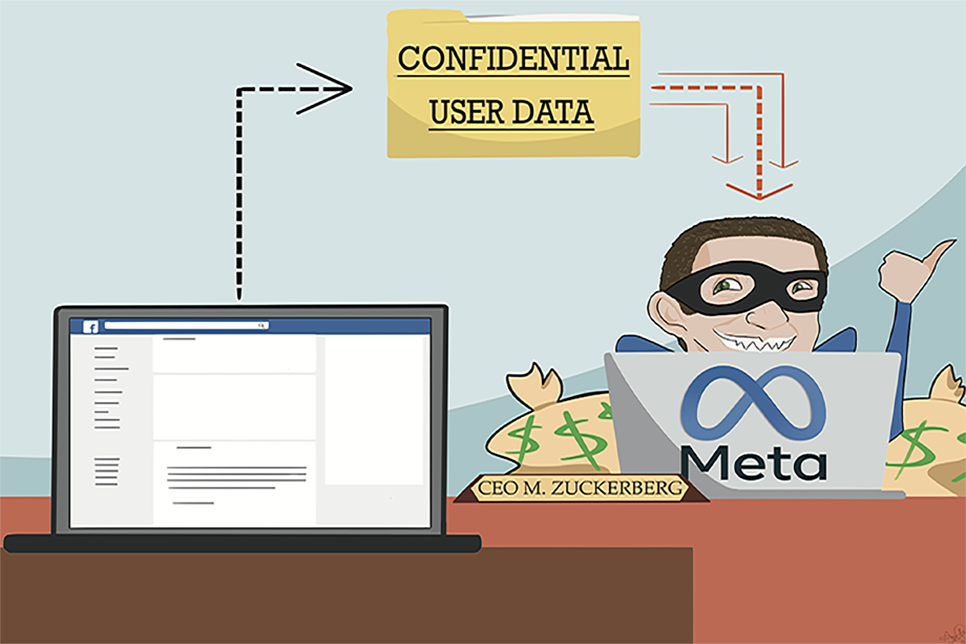
The internet is a necessary service, like running water or plumbing for a home. The U.S infrastructure heavily relies on it, but so many dilemmas haven’t been solved yet — from the government overstepping its bounds to society’s overtrust of faceless corporations with data.
This double-edged sword is something that needs to be discussed before it is too late.
Technology has advanced so fast over the last 21 years that now information gathered from data is more important than the individual. Just 14 years ago, the first generation iPhone was released to the public. It seems like in the blink of an eye, everyone’s data became the property of a handful of corporations.
Meta — previously known as Facebook — has been caught in multiple scandals such as knowing the harm of social media on kids but still targeting them to having users’ data legally obtained by a political party data-analytics firm.
It would be easy to put everything on Meta, but it is only the face of the problem. Too much faith is put into faceless corporations to protect personal information. Millions of people have their banking information or other sensitive information saved on phones and desktops.
Apple has made strides to protect personal information, but what is stopping it from doing what Meta did?
A for-profit business is usually not going to do the right thing over making more money. That is just a fact in a capitalist society.
While there are basic ways of protecting personal information on the internet, such as a VPN, it isn’t enough. We live in a society that heavily relies on technology, so buying a log house in the middle of the woods wouldn’t be an appealing solution.
This is where the government should step in and have more regulations that restrict data tracking so those big corporations will have to be more transparent with people’s data. But, there is a pretty major issue. The average age in the Senate is 62.9 years old. The people in Congress are too old to understand the importance of this issue or even how social media works.
Every day Silicon Valley is growing more and more powerful without proper regulations. A modern-day Franklin D. Roosevelt is needed. Someone that will be willing to break these companies up.
While the government does need to act, in the same vein, it needs to take a step back. It’s no secret that our generation does not have the same privacy as other generations did. But, with the implementation of the Patriot Act, a policy passed six weeks after 9/11 that grants law enforcement more power to “prevent terrorist attacks,” the U.S. has been abusing this power for 21 years now.
These kinds of laws have given the U.S. the ability to record phone calls and collect data from the internet from normal citizens under the pretext of looking for terrorist activity. The only reason this information is publicly known is because of Edward Snowden — who leaked it to the press in 2013.
The Patriot Act did expire in 2020 due to congress’ inaction to reauthorize it, but the most harmful provisions are still in effect.
Now the U.S. government is using the Jan. 6 Capital riots as an excuse to expand that power.
Joe Biden released the “National Strategy for Countering Domestic Terrorism” in June 2021. Instead of the false pretext being a foreign enemy as the reason to spy on citizens, it will be whatever the current administration determines is domestic terrorism. This could be a slippery slope.
These over-reaching measures have been abused for far too long. It will give bloated government agencies more funds and power to problems that they are already capable of solving.
The remaining Patriot Act provisions should be removed and be remembered as a bad policy that overstayed its welcome. The government doesn’t have the right to spy on people, and corporations shouldn’t have the right to sell user data without permission.

